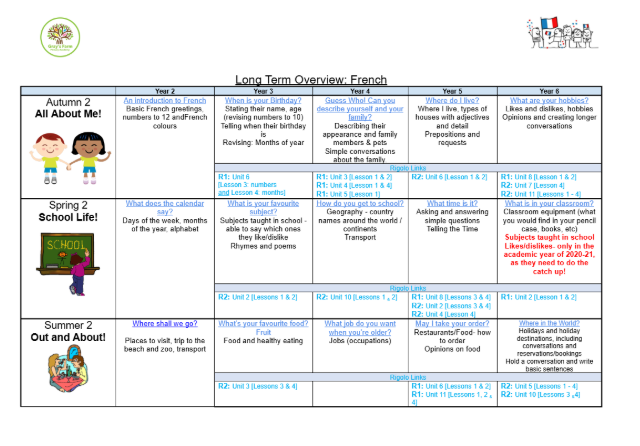French

In England, teaching a modern or ancient foreign language is compulsory for all Key Stage 2 primary school students (ages 7–11) as part of the National Curriculum. At Gray’s Farm we also introduce French at Key Stage 1, with children learning basic songs, phrases and french words.
Here at Gray’s Farm, pupils learn French as part of our commitment to providing a broad and balanced curriculum; helping them to develop a love of languages and confidence in communicating with others. French lessons include a balance of speaking, listening, reading, and writing, so pupils build a strong foundation for future language learning in secondary school. French is taught in a 30-minute session each week. We follow a bespoke curriculum designed by our teaching team; ensuring lessons are engaging, progressive, and tailored to the needs of our pupils. Learning takes place through a variety of activities such as songs, stories, games, and conversations, helping children build skills and confidence over time. We regularly assess pupils’ progress through observation, participation, and short practical tasks to ensure they are developing their language skills effectively.
Our aim is to make learning French enjoyable and meaningful, helping pupils gain valuable communication skills, cultural awareness, and curiosity about the wider world.

Want to practise and explore languages at home?
https://www.french-games.net/frenchgames
https://www.bbc.co.uk/bitesize/topics/z74gcqt/articles/zyvnm39
https://www.digitaldialects.com/French.htm
https://www.topmarks.co.uk/Search.aspx?q=french
SEND - Ambition and Access in MFL
| Ambition – What are we aiming for children with SENs to achieve in this subject? | Access – What amendments are made to the subject in order to help children with SENs to achieve? |
|---|---|
| By the time children leave year 6, they are at an entry level corresponding to the MFL curriculum in KS3 and are able to make the transition to secondary smoothly using their previous learning and knowledge from KS2. SEN is not a not a limiting factor. Differentiated written work to be made available when required. Smaller groups considered when completing verbal work/assessments. |
|